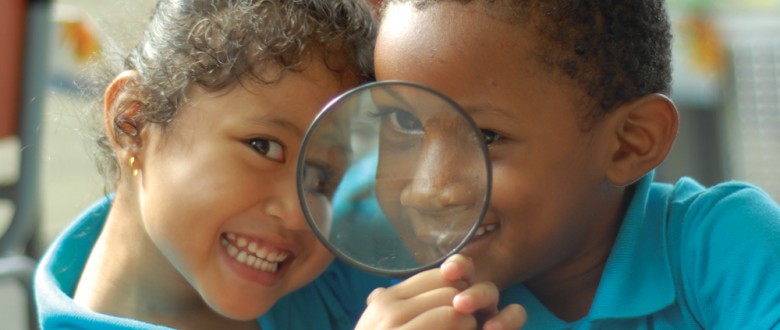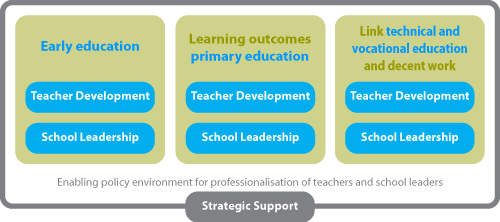
Our organisation is in a transition with respect to its educational focus. On the one hand we round up our current Multi-Year Programme in 2013. At the same time we plan a new Multi-Year Programme, which will start in 2014. VVOB increases its specialisation in education for development. We focus on three objectives and three education components.

Education objectives
The education sector is a very broad domain. In order to offer our partners even more high-level expertise, VVOB increases its specialisation in education for development. We focus on three objectives:
-
Early Education teachers and school leaders provide all learners equal opportunities to enhance their further education and future success.
-
Primary Education teachers and school leaders use appropriate teaching, monitoring and follow-up strategies to improve learning outcomes of all learners in numeracy, literacy and life skills.
- Teachers and school leaders of Secondary Technical and Vocational Education prepare all learners according to the demands of the society and the world of decent work.
Education components
To realise our education objectives, we focus on capacity development of local education authorities on the following three education components:
-
Teacher Development
Teachers are key in improving learning outcomes of children; a focus on Teacher Development is therefore an obvious choice. The primary focus is on capacity development of organisations and institutions that target the improvement of pedagogical and didactical competences of teachers, their access to qualitative learning materials and active pedagogies and didactics. This involves not only appropriate initial teacher training, but also professional growth at different stages in their learning process.
The context analysis within and with the country determine on which aspects of the professional development of teachers the programme focuses.
-
School Leadership
The professional development of teachers also requires effective school leadership. School leadership is therefore another focus area of VVOB. School leaders who support, evaluate and develop teacher quality have a high impact on children’s learning outcomes. And from an equity perspective, effective school leaders are particularly important in the improvement of low performing and disadvantaged schools.
-
Strategic Support
Enabling a strong policy environment for the professionalisation of teachers and school leaders is equally important. VVOB will enhance dialogue, communication and collaboration between different educational stakeholders in the areas of teacher development and school leadership.
A worldwide participatory process
This strategy is the result of a worldwide participatory process. It included among others a lot of input from external and internal education and development experts. We took into account the most important education needs as identified in international research and also the education strategies and priorities of our partner countries.
The local contexts of our partner countries will also determine how these education objectives and components can be put into practice. This is not a blueprint that can be replicated. It is rather a strategic framework that gives direction. Our partners and local teams used this framework to do a context analysis, to compare it with the education plans of the country, to identify needs and targets... and to formulate their education programmes... Our next Multi-Year Programme takes off in January 2014.
Six crucial dimensions of Quality Education
VVOB believes that education leads to empowerment: a process of strengthening individuals, organisations and communities so they get more control over their own situations and environments. Quality education is a crucial factor in combating poverty and inequality in society. In quality education, VVOB distinguishes six dimensions that all interventions of the organisation need to meet.
-
Equity
The VVOB definition refers to "all learners". This term refers to non-discrimination and equity. Equity in education means that personal and social circumstances such as gender, ethnic origin or family background are not obstacles to achieving educational potential and that all individuals reach at least a basic minimum level of skills. VVOB in particular focuses on gender equity.
-
Contextualisation and Relevance
Quality education cannot be based on a blueprint that is applicable in all situations. Solutions and adaptations of education systems must be based on the real needs of a country and/or community.
-
Child-friendly Teaching and Learning
Quality education puts the child in the centre and helps it to reach his or her full potential. Quality Education requires children’s active participation.
-
Sustainability
Educational change processes often need time to be realized. By enhancing the capacities of local education authorities, VVOB aims to institutionalise these processes.
-
Balanced Approach
Quality education aims at developing a balanced set of capabilities of children they require to become economically productive, develop sustainable livelihoods, contribute to peaceful and democratic societies and enhance individual well-being.
-
Learning Outcomes
After completing a certain level of education, children must have developed a minimum standard of skills. Quality education requires a results-oriented approach.




